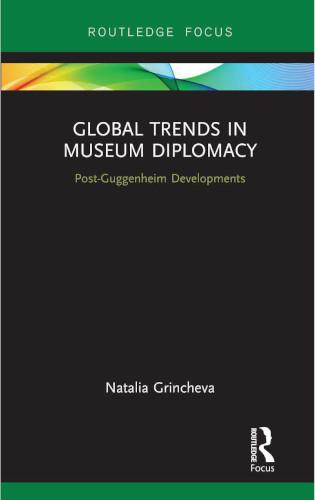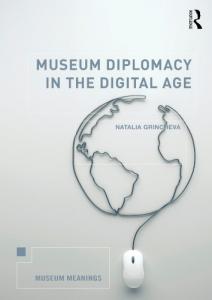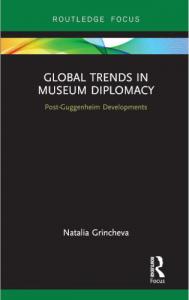Global Trends in Museum Diplomacy: Post-Guggenheim Developments

Global Trends in Museum Diplomacy traces the transformation of museums from publicly or privately funded heritage institutions into active players in the economic sector of culture. Exploring how this transformation reconfigured cultural diplomacy, the book argues that museums have become autonomous diplomatic players on the world stage.
The book offers a comparative analysis across a range of case studies in order to demonstrate that museums have gone global in the era of neoliberal globalisation. Grincheva focuses first on the Solomon R. Guggenheim Foundation, which is well known for its bold revolutionising strategies of global expansion: museum franchising and global corporatisation. The book then goes on to explore how these strategies were adopted across museums around the world and analyses two cases of post-Guggenheim developments in China and Russia: the K11 Art Mall in Hong Kong and the International Network of Foundations of the State Hermitage Museum in Russia. These cases from more authoritarian political regimes evidence the emergence of alternative avenues of museum diplomacy that no longer depend on government commissions to serve immediate geo-political interests.
Global Trends in Museum Diplomacy will be a valuable resource for students, scholars and practitioners of contemporary museology and cultural diplomacy. Documenting new developments in museum diplomacy, the book will be particularly interesting to museum and heritage practitioners and policymakers involved in international exchanges or official programs of cultural diplomacy.
Reviews
"This book has made important contributions to at least two debates. The first concerns museums as political actors. The second contribution is to the debate about cultural diplomacy. For a long time, scholars and practitioners presumed that the state is the main agent of cultural diplomacy. However, many are increasingly acknowledging, or at least exploring the possibility, that non-state actors participate in cultural diplomacy alongside states. The book advances this debate by theorizing the specific conditions under which museums might be considered to function as (cultural) diplomats. Overall, the great strength of this book is Grincheva’s effort to drill deeper to theorize the various phenomena that are emerging from the work of the modern museum in the current moment. She draws nuanced and thought-provoking conclusions about this. Grincheva indicates that one of her goals is to provide a fresh perspective and she certainly does. I look forward to teaching a class on diplomacy so I can assign this very informative book."
~Patricia Goff, Associate Professor and Chair, Political Science and North American Studies, Wilfrid Laurier University
"The main contribution of the book is that it expands museum studies scholarship to cultural diplomacy while elaborating several cases demonstrating a shift in museums’ international activities from a political endeavor to a more autonomous pursuit of institutional missions. It can be useful for scholars and educators of new museology, as well as museum or cultural diplomacy professionals. On the whole, the book is very well structured, insightful and inspiring. Thus, skeptic voices, who might worry about the topic of Coca-colonization, neo-imperialism and McGuggenheim can be assured, the book is not a repetition of controversial issues. Instead it opens the discussion on new phenomena, taking the reader to most different parts of the world with its several international examples illustrating the main arguments."
~Kinga Hamvai, Moholy-Nagy University of Art and Design Budapest, Budapest, Hungary
Global Trends in Museum Diplomacy: Post-Guggenheim Developments
Natalia Grincheva
Routledge, 2019
ISBN-13: 9780815370949, 9781351190251, 9781351190275
ISBN-10: 0815370946
ASIN: B07TKD2J8Z

